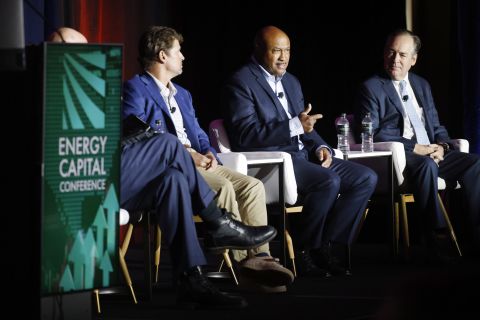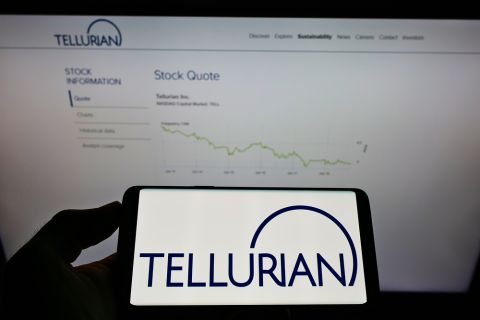Prime Minister Rishi Sunak watered down Britain's plans to tackle climate change on Sept. 20, saying he would delay a ban on sales of new petrol cars to maintain the consent of the British people in the switch to net zero.
Sunak said he remained committed to the legally-binding target of reaching net zero emissions by 2050 but said Britain could afford to make slower progress in getting there because it was "so far ahead of every other country in the world."
To ease what he described as "unacceptable costs" on British households from the energy transition, he delayed a ban on new petrol and diesel cars until 2035 from 2030, said he would ease the transition to heat pumps from gas boilers in homes and said he would not force any household to improve their insulation.
Sunak said he was changing the policy because previous governments had moved too quickly to set net zero targets without securing the support of the public.
"If we continue down this path, we risk losing the British people and the resulting backlash would not just be against specific policies, but against the wider mission itself," he told a press conference.
Businesses and environmental campaigners have said the historic decarbonization of the economy marks an opportunity to spur investment and economic growth and create well-paid jobs, including in former industrial towns.
For that to succeed, they say the government needs to provide a stable and predictable environment to encourage companies and consumers to make the shift, and the UK had long described itself as a leader in the move to a green economy.
But with a national election expected next year, Sunak appears to be betting that scaling back some green policies will win over voters who are struggling with stubbornly high inflation and stagnant economic growth.
In recent weeks, the government has also unnerved investors by delaying, again, post-Brexit border checks, cast doubt on the future of the country's yet-to-be-built high-speed rail line and failed to draw any bids at an offshore wind auction.
Angry response
News that it would delay several climate targets drew scorn from businesses producing everything from cars to solar panels, electric vehicle charging points and power.
Lisa Brankin, the chair of Ford UK, was scathing on the change to the 2030 EV car target: "Our business needs three things from the UK government: ambition, commitment and consistency. A relaxation of 2030 would undermine all three."
The opposition Labour Party, well ahead in opinion polls, said it would stick with the original 2030 target.
The Institutional Investors Group on Climate Change said the move would deter investment and urged Britain to be more like the EU and U.S. in setting out supportive and stable policies.
Chris Norbury, head of the U.K. arm of energy firm E.ON, Britain's third largest domestic energy supplier, said pitting the debate as "green vs cheap" was a false argument when delaying the move would cost more in the long run.
Falling emissions
Britain was the first major economy to create a legally binding 2050 net zero target, and emissions have fallen almost 50% since 1990 as coal power plants closed and offshore wind power took off.
Sunak says that puts Britain ahead of other major economies.
But the government's own independent climate adviser said in June that Britain was not doing enough to hit its targets, and it said on Sept. 20 the announcement was likely to take Britain further away from being able to meet its legal commitments.
Sunak, when asked how Britain could hit the 2050 target if it watered down earlier ones now, said there was room for manoeuver because the country had overdelivered in the past, industry costs were falling faster than expected and the public's uptake of climate measures had been better than predicted.
"We believe we are absolutely on track to deliver our commitments," he said.
Recommended Reading
Utica Oil E&P Infinity Natural Resources’ IPO Gains 7 More Bankers
2024-11-27 - Infinity Natural Resources’ IPO is expected to provide a first-look at the public market’s valuation of the Utica oil play.
Post Oak Backs New Permian Team, But PE Faces Uphill Fundraising Battle
2024-10-11 - As private equity begins the process of recycling inventory, likely to be divested from large-scale mergers, executives acknowledged that raising funds has become increasingly difficult.
Souki’s Saga: How Tellurian Escaped Ruin with ‘The Pause,’ $1.2B Exit
2024-09-11 - President Biden’s LNG pause in January suddenly made Tellurian Inc.’s LNG export permit more valuable. The company’s July sale marked the end of an eight-year saga—particularly the last 16 months, starting with when its co-founder lost his stock, ranch and yacht in a foreclosure.
Analyst: Is Jerry Jones Making a Run to Take Comstock Private?
2024-09-20 - After buying more than 13.4 million Comstock shares in August, analysts wonder if Dallas Cowboys owner Jerry Jones might split the tackles and run downhill toward a go-private buyout of the Haynesville Shale gas producer.
BP Profit Falls On Weak Oil Prices, May Slow Share Buybacks
2024-10-30 - Despite a drop in profit due to weak oil prices, BP reported strong results from its U.S. shale segment and new momentum in the Gulf of Mexico.
Comments
Add new comment
This conversation is moderated according to Hart Energy community rules. Please read the rules before joining the discussion. If you’re experiencing any technical problems, please contact our customer care team.





